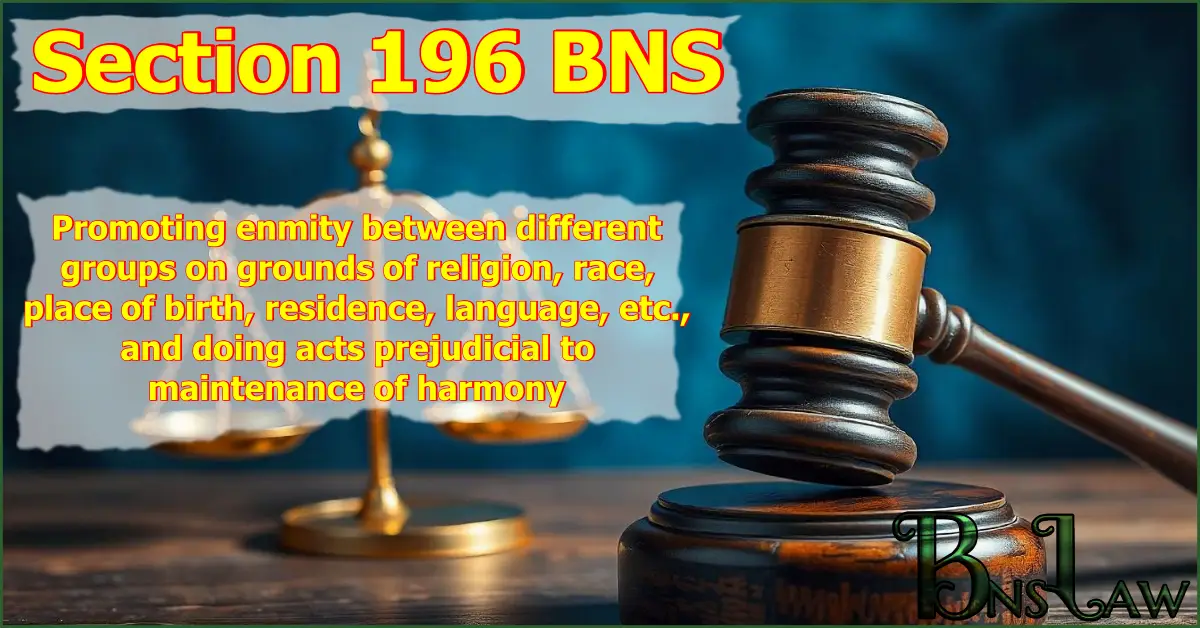Section 196 BNS | BNS 196
196(1) BNS
Whoever—
- by words, either spoken or written, or by signs or by visible representations or through electronic communication or otherwise, promotes or attempts to promote, on grounds of religion, race, place of birth, residence, language, caste or community or any other ground whatsoever, disharmony or feelings of enmity, hatred or ill-will between different religious, racial, language or regional groups or castes or communities; or
- commits any act which is prejudicial to the maintenance of harmony between different religious, racial, language or regional groups or castes or communities, and which disturbs or is likely to disturb the public tranquillity; or
- organises any exercise, movement, drill or other similar activity intending that the participants in such activity shall use or be trained to use criminal force or violence or knowing it to be likely that the participants in such activity will use or be trained to use criminal force or violence, or participates in such activity intending to use or be trained to use criminal force or violence or knowing it to be likely that the participants in such activity will use or be trained to use criminal force or violence, against any religious, racial, language or regional group or caste or community and such activity for any reason whatsoever causes or is likely to cause fear or alarm or a feeling of insecurity amongst members of such religious, racial, language or regional group or caste or community,
shall be punished with imprisonment which may extend to three years, or with fine, or with both.
196(2) BNS
Whoever commits an offence specified in sub-section (1) in any place of worship or in any assembly engaged in the performance of religious worship or religious ceremonies, shall be punished with imprisonment which may extend to five years and shall also be liable to fine.
READ OTHER SECTIONS OF CHAPTER XI — OF OFFENCES AGAINST THE PUBLIC TRANQUILLITY
| Section No. | Section Title |
|---|---|
| 189 | Unlawful assembly. |
| 190 | Every member of unlawful assembly guilty of offence committed in prosecution of common object. |
| 191 | Rioting. |
| 192 | Wantonly giving provocation with intent to cause riot-if rioting be committed; if not committed. |
| 193 | Liability of owner, occupier, etc., of land on which an unlawful assembly or riot takes place. |
| 194 | Affray. |
| 195 | Assaulting or obstructing public servant when suppressing riot, etc. |
| 196 | Promoting enmity between different groups on grounds of religion, race, place of birth, residence, language, etc., and doing acts prejudicial to maintenance of harmony. |
| 197 | Imputations, assertions prejudicial to national integration. |
FAQs of BNS Section 196
-
196 BNS punishment and fine
Punishment and fine under Section 196 of the BNS—
196(1): Imprisonment for 3 years, or fine, or both.
196(2): Imprisonment for 5 years and fine. -
196 BNS cognizable or not
The offence under all sub-sections of Section 196 of the BNS is cognizable.
-
196 BNS bailable or not
The offence under all sub-sections of Section 196 of the BNS is non-bailable.
-
196 BNS trial court
Offence specified in all sub-sections of Section 196 of the BNS is triable by the Magistrate of the first class.
Important Points
- Cognizable Offences: These are offences where a police officer can arrest a person without a warrant.
- Non-Cognizable Offences: These are offences where a police officer cannot arrest a person without a warrant.
- Bailable Offences: These are offences where the accused can get bail from the police station itself. All bailable offences are listed in the First Schedule of the Bharatiya Nagarik Suraksha Sanhita (BNSS).
- Non-Bailable Offences: Offences in which bail is not granted directly from the police station but after hearing the case in the court, the judge decides when bail will be granted. All non-bailable offences are listed in the first schedule of the Bharatiya Nagarik Suraksha Sanhita (BNSS).
- In the above FAQ, “trial court” means the court that has jurisdiction to try the offence.
- In the above FAQ, the expression “Magistrate of the first class” and “Any Magistrate” does not include Executive Magistrates.
Read other Sections of the BNS
Reference Link: New Criminal Laws (BNS), Ministry of Home Affairs







